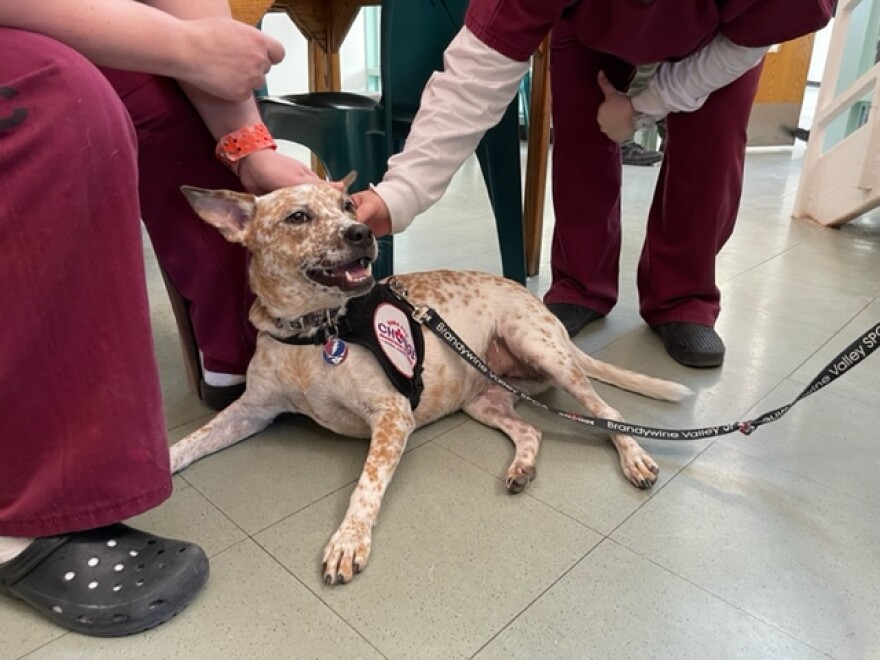The excitement level at Baylor Correctional Institution increases whenever Stella walks into a room. She’s a 3 1/2-year-old brown and white spotted Australian Cattle Dog - Pitbull mix. And the inmates at this women’s prison look forward to her visits.

"I couldn’t wait for her to come in just to play with her. It’s a bunch of joy," said Ashley, an inmate at the facility.
Ashley is among dozens of inmates Stella and other pets visit as part of an animal-assisted therapy program called Paws for Change.
Another inmate, Kimberly, says it reminds her of the three cats she has waiting for her at home.
"It just lifts my spirits because you don’t realize what you miss until you’re in here and you can’t pet your animals at home," she said.
The program launched last September after prison staff looked for new ways to expand their services.
"We put some research together and said why don’t we reach out to organizations and see if anybody would want to have animal assisted therapy teams come in; maybe we could reduce a little bit of violence, reduce a little bit of stress, give the women some kind of outlet to their therapeutic needs and it's been great," said the facility's treatment administrator, Rachel Boulden.
The Brandywine Valley SPCA supplies the animals that visit about twice a week and interact with dozens of inmates.

"People come to the shelter and see animals and they’re happy, but to see someone fully have an emotional kind of breakthrough is amazing and it's amazing for the animals too because most of our animals that are participating were adopted from our shelters, so to see them kind of give back to the communities that rescued or saved them is really massive for us," said SPCA program director Rachel Golub.
It’s important to the dogs’ handlers as well, including Jessie Tharp who adopted Stella from the Brandywine Valley SPCA a little over a year ago.
"Once we kind of spent time with her and realized how sweet and gentle she was all the time and we saw how much she liked other people, we said to ourselves, 'wow, she would be a really good therapy dog' and then it just so happened that not long after that, Brandywine Valley started their program, so we signed her up and she passed all the required training," said Tharp.
Golub says animal-assisted therapy does take a special animal and special training. Dogs like Stella are first evaluated for their temperament and then, if determined to be a good fit for a therapy program, start a rigorous eight-week training program that Golub says is more intense than the typical PetSmart obedience class.

"What they need to do the best is relate to people," she said. "That’s really what we look for is that at the cornerstone of who they are, people are what’s most important and most motivating so it’s not toys, it’s not food it’s connection with people."
Stella passed the training with flying colors and Tharp says she had little hesitation in joining Paws for Change.
"I think it was more that I’ve never been in a correctional facility so just maybe a little nervous about that, but once I came the first time and met with the staff and Stella had her first day here, there really was no qualms about it," she said.
But not everyone likes dogs and that’s ok says DOC’s Rachel Boulden.
"Some of the residents here are scared of dogs and they will tell you that, 'no thank you; I don't want to be near the dog,'" she said.
She said some just have preferences for other animals. Rachel Golub of the SPCA has already brought in her own bearded dragon, called Beardy, and is considering including other animals.
"It’s interesting to hear the different things that people gravitate to, so it’s not always just cats and dogs. It is reptiles, it is fish, it is chickens, even rabbits - a lot of people have had rabbits as pets - and it kind of triggers some memories for them that were positive and I feel like a lot of people hold on to that when they’re in a facility like this and so if we can kind of help with that I’m all about it," she said.

And while the program isn’t just about dogs - animal assisted therapy isn’t just for correctional institutions either. The SPCA often brings animals into other facilities such as elementary schools and memory care units at senior centers.
"Having animals come can actually sometimes trigger their memories back which is a really cool thing to watch," said Golub.
And the inmates and staff at Baylor say the dogs have a significant impact there too. Before embarking on the program, Boulden researched the effectiveness of animal therapy. She said it showed a reduction in violence and increases in inmates' engagement with their therapists.
Inmates like Ashley say it promotes healing and peace in an environment that can often be chaotic and stressful.
"I think it helps mentally. You go through a lot in here - a lot of change and...getting help with addiction and it just gives us hope, reassurance, some hope from the animals," she said.
For more information on the program, visit https://bvspca.org/pawsforchange/




